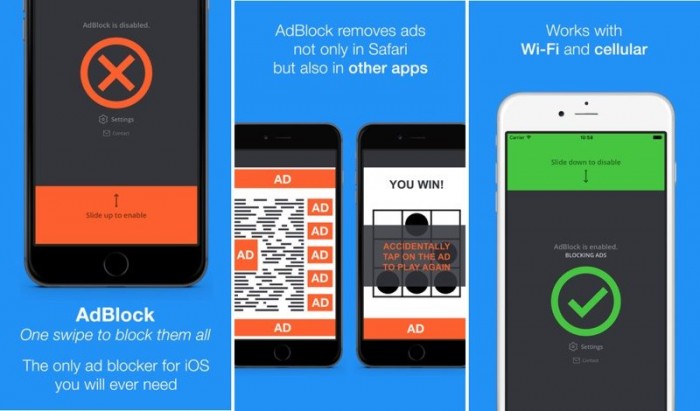
It looks like Apple is cracking down on root certificate/VPN-based adblock applications that are developed to block ads in third party apps. It is reported that Apple would only permit first-party ad blockers promoted via Safari.
This sudden shift in Apple’s policy rolled in after Tomasz Koperski -CTO of Future Mind that developed Weblock, Adblock and Atmosphere- had contacted Apple’s review team when his latest Adblock update for iOS was revoked. That is when he was told that Apple no longer accepts VPN-based ad-blocking apps.
“After submitting an appeal to the App Review Board, a member of the Review Team contacted me directly via phone and informed that Apple has officially changed their policy regarding VPN/root certificate based ad blockers on the App Store and is no longer accepting updates of apps, which directly block content in third party apps,” Koperski said. “The only officially allowed ad blocking method is now Safari Content Blockers.”
The app appears to have breached section 4.2.1, which says “Apps should use APIs and frameworks for their intended purposes and should indicate that integration in their app description.” In more details, Future Mind was informed that their update was revoked because “Your app uses a VPN profile or root certificate to block ads or other content in a third-party app, which is not allowed on the App Store.”
Adblock uses root certificates and VPNs to block ads promoted by third-party apps, which is no longer accepted at the App Store even though the app has been sold at the Store since 2014 and is considered to be among the very first VPN-based ad blocking applications.
Future Mind was informed that the only way to get their app to be available for purchase on the Apple Store is to switch to Safari Content Blocker instead of blocking ads based on root certificates and VPNs.
It is uncertain why Apple has taken such strong stance to change its policy after all this time, especially when there are several VPN-based ad-blocking applications that were recently updated last June. The only reason that one could possibly think of is “money”. There are native applications, such as Apple News that display ads to make profit. This means that Apple could be yanking off VPN-based ad-blockers to pave the way for making more money.
This is not the first time Apple takes such actions. Recently, Apple went on a cleaning frenzy to swipe out outdated and clone applications from its App Store.

